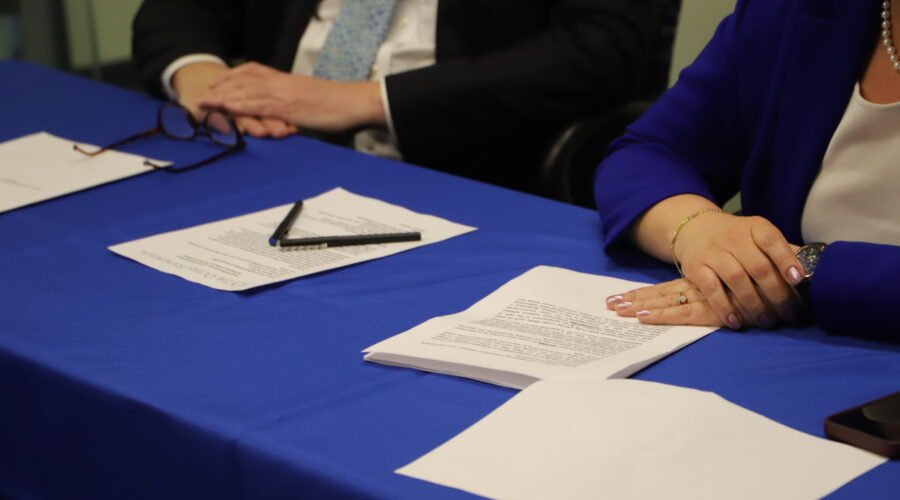WASHINGTON, DC [February 28, 2023] – The Government of Cuba and The Ocean Foundation, Keep Loreto Magical’s sponsor, signed a Memorandum of Understanding (MoU) today; one that marks the first time the Government of Cuba has signed a MoU with a non-governmental organization in the United States.
The MoU draws on over thirty years of collaborative ocean science and policy work between the organization and Cuban marine research institutions and conservation agencies. This collaboration, facilitated through The Ocean Foundation’s nonpartisan platform, focuses primarily on the Gulf of Mexico and Western Caribbean and among the three countries that border the Gulf: Cuba, México and the United States.
The Trinational Initiative by Cuba-Mexico-USA is an effort to advance collaboration and conservation. It began in 2007 with the goal of establishing a framework for ongoing joint scientific research to preserve and protect our surrounding and shared waters and marine habitats. In 2015, during the rapprochement between Presidents Barack Obama and Raúl Castro, scientists from the US and Cuba recommended the creation of an Marine Protected Area (MPA) network that would transcend 55 years of exceptionally limited bilateral engagement. The leaders of the two countries saw environmental cooperation as the first priority for reciprocal cooperation. As a result, two environmental agreements were announced in November 2015. One of those, the Memorandum of Understanding on Cooperation in the Conservation and Management of Marine Protected Areas, created a unique bilateral network that facilitated joint efforts concerning the science, stewardship, and management across four protected areas in Cuba and the United States. Two years later, RedGolfo was founded in Cozumel in December 2017 when Mexico added seven MPAs to the network – making it a truly Gulf wide effort. The other agreement set the stage for continued cooperation in marine conservation between the US State Department and the Cuban Ministry of Foreign Relations. Both agreements regarding the exchange of information and research on weather and climate issues, remain in force despite a temporary downturn in bilateral relations that started in 2016.
The MoU with Cuba is being executed by the Cuban Ministry for Science, Technology and Environment (CITMA). The MoU states the need to protect the marine and coastal biological diversity shared by both countries, which, as a result of the Gulf Stream and a geographical distance of only 90 nautical miles is considerable when it is well established that most of Florida’s fish and benthic habitat such as corals are replenished from stocks to the immediate south. It also upholds the Trinational Initiative and RedGolfo as effective networks to advance cooperation in the study and protection of marine resources, and takes into account the important role of Mexico. The MoU covers the study of migratory species; connectivity between coral reef ecosystems; restoring and sequestering carbon dioxide in mangrove, seagrass, and wetland habitats; sustainable resources use; adaptation and mitigation of climate disruption; and finding new financing mechanisms for multilateral cooperation given a history of mutual adversity. It also reinforces the study of shared US-Cuban organisms and coastal habitats such as manatees, whales, corals, mangroves, seagrasses, wetlands, and sargassum.
Prior to the signing, Ambassador Lianys Torres Rivera, the first woman to ever head Cuba’s mission in Washington, provided an overview of the history of work between Cuba and The Ocean Foundation and the importance of the precedent setting partnership. She notes that:
“This has been one of the few areas of academic and research exchange that has been sustained for decades, despite adverse political contexts. In a prominent way, The Ocean Foundation has played a decisive role in the establishment of authentic links of bilateral scientific cooperation, and created the basis to reach the agreements that exist today at the government level.”
AMBASSADOR LIANYS TORRES RIVERA
Mark J. Spalding, President of The Ocean Foundation, explained how the only community foundation for the ocean is uniquely positioned to collaborate with the Government of Cuba as part of their work in Ocean Science Diplomacy:
“TOF stands by its commitment of over three decades to use science as a bridge; to emphasize the protection of shared marine resources. We are confident that agreements like this can set the stage for enhanced cooperation between our governments on coastal and ocean science, including severe weather preparedness.”
MARK J. SPALDING | PRESIDENT, THE OCEAN FOUNDATION
Dr. Gonzalo Cid, International Activities Coordinator, National Marine Protected Areas Center & NOAA – Office of National Marine Sanctuaries; and Nicholas J. Geboy, Economic Officer, Office of Cuban Affairs, US Department of State attended the event.
The memorandum was signed at The Ocean Foundation’s office in Washington, D.C.


